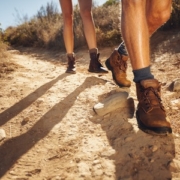Scooters, Skateboards, and Sidewalk Sports: A Foot Health Balancing Act
Skateboarding, scootering, and other blacktop board sports feel like a staple of American upbringing. From Heely’s (remember those shoes with built-in wheels?) to Ripsticks, there has been a range of driveway toys and activities that have caused an equal amount of pleasure and pain.
Falling off a board on your neighborhood street seems like fun, but understanding the potential dangers and taking preventive measures can help you enjoy these activities without compromising your foot health. We at Carrollton Foot Center are here to fill you in.
Common Foot and Ankle Injuries
- Ankle sprains: The repetitive twisting and turning in board sports can strain the ankle ligaments, and tricks on skateboards inevitably lead to awkward falls.
- Fractures: Falls and impacts can result in fractures of the foot, ankle, or leg bones. Longboards down steep hills can reach speeds of 80 miles per hour, which spells obvious trouble for catastrophic foot injuries.
- Scooter Fractures: These can occur from scooter whiplash. They swivel quite loosely, and if they hit you hard enough, it can fracture your ankle.
- Abrasions and cuts: Skin injuries are common due to falls and contact with the board or ground.
- Tendonitis: Inflammation of the tendons in the foot or ankle can occur due to overuse. Boarding on hard pavement leads to hard landings, and the force generated to perform tricks lends itself to inflammation.
Foot Care Advice
Protective gear is more than just a helmet and some kneepads. We recommend skating in shoes such as Vans or Nike’s SB brand. These shoes are designed for extra padding and have durable soles. Also, wear socks to prevent blisters, and consider using ankle braces for added support.
This may seem like a challenge, but try skating in safer areas where the terrain isn’t uneven. Skate parks offer smooth grounding that reduces the risk of injury. You also have a better chance of learning proper techniques, which can teach you how to stay safe on your board.
Consult with Board-certified podiatrist Dr. Naghmeh Lilly Khavari, a respected professional who is dedicated to her patients in Denton, Dallas, and Collins Counties. Dr. Khavari treats a wide breadth of issues, from ingrown toenails to foot and ankle injuries. Call Carrollton Foot Center’s office (located in Carrollton, Texas) at (469)-998-3668 to schedule your first appointment today!




